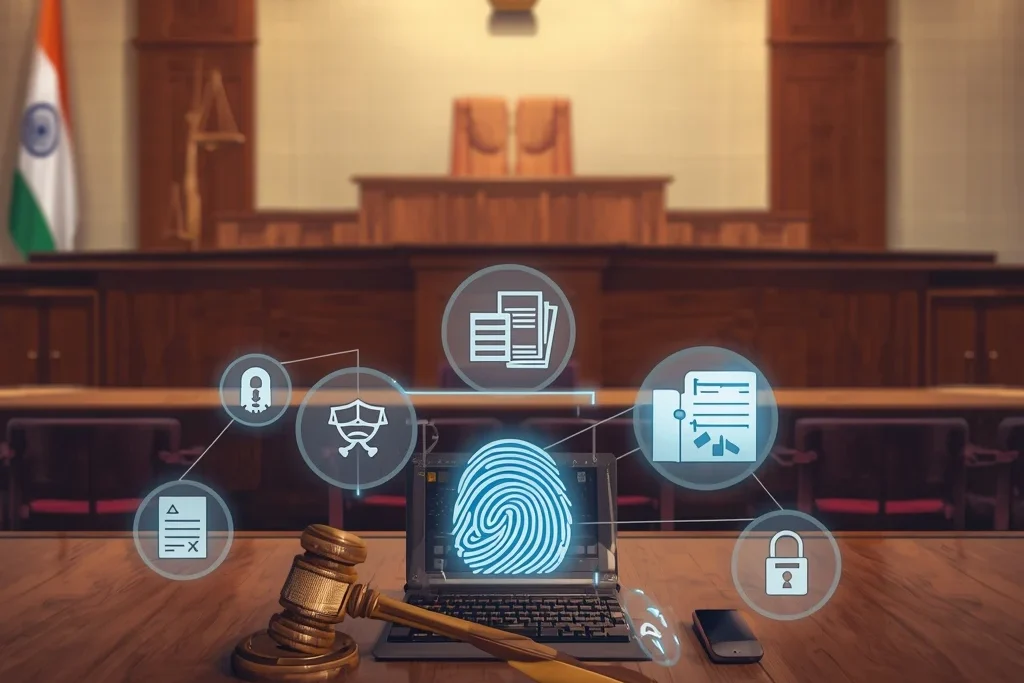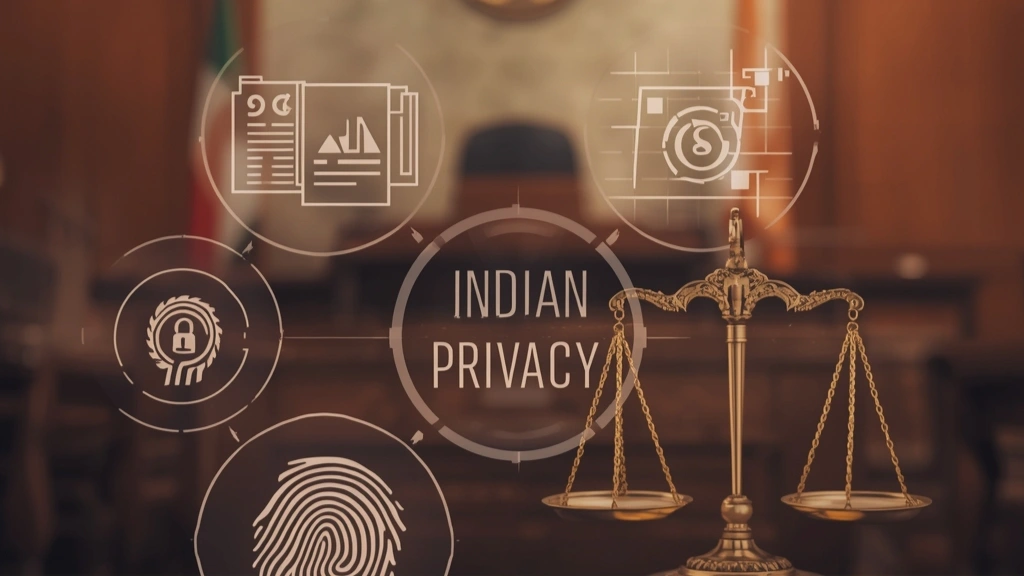Introduction
Indian Privacy Laws are becoming increasingly important as India moves deeper into the digital age. The Data Protection Act India and the Personal Data Protection Bill 2023 aim to safeguard citizens’ data while ensuring responsible use by organizations.
Recognizing the Right to Privacy under Indian Constitution, these laws strengthen Digital Privacy Rights in India and set a clear framework for data protection and accountability.
What are India’s Main Privacy Laws?

India has witnessed a fast evolution in its approach to records safety and privacy. The foundation of Indian Privacy Laws lies in ensuring that all of us has manipulate over their personal information in an an increasing number of virtual society. Over the years, India has superior a complex criminal framework that blends constitutional guarantees, sectoral tips, and specialised guidelines.
The cornerstone of this crook landscape is the Right to Privacy under Indian Constitution, installed thru the landmark Justice K.S. Puttaswamy vs. Union of India (2017) judgment, in which the awesome court docket docket declared privacy as a essential proper. This judgment redefined personal liberty and set the stage for entire privateness law similar to the Data Protection Act India.
The ones jail measures collectively make sure that citizens have autonomy over their digital statistics and that businesses coping with personal information keep obligation and transparency. Together, they define the core of Indian Privacy Laws in the modern digital generation.
What is the Digital Personal Data Protection Act 2023?
The Personal Data Protection Bill 2023, now enacted because the Data Protection Act India, represents a prime leap in the course of aligning India’s facts legal guidelines with international privateness requirements. This act governs how non-public records is amassed, stored, and processed for the duration of public and private sectors.
Underneath the Personal Data Protection Bill 2023, each organisation ought to gain precise consent from humans in advance than accumulating private facts. The regulation classifies facts as non-public, touchy, or important, with each class trouble to strict compliance necessities. It additionally mandates facts localization for certain types of facts and requires organizations to rent information safety officials.
The act empowers citizens with several Digital Privacy Rights in India, which includes the proper to get proper of entry to, accurate, and erase their records. It additionally establishes the Data Protection Board of India, which oversees enforcement and addresses grievances related to statistics misuse or breach.
This law reflects India’s dedication to protective person records at the same time as promoting innovation in its digital economic system. As a result, Indian Privacy Laws are now globally recognized as one of the emerging data protection frameworks in the world.
What Rights Do Citizens Have Under Privacy Laws?
The Digital Privacy Rights in India are designed to give individuals more manipulate over their virtual footprint. Those rights ensure equity and transparency in how private facts is treated.
| Right | Description |
|---|---|
| Consent | Data can’t be collected without clear permission. |
| Access | People can see how their data is used. |
| Correction/Erasure | Wrong data can be fixed or deleted. |
| Grievance | Complaints can be filed to the Data Protection Board. |
| Nominate | A representative can act for the user if needed. |
Key rights underneath the Data Protection Act India consist of:
- Proper to consent: no entity can accumulate non-public facts without express consent.
- Proper to get right of entry to: citizens can request copies of their information and apprehend the way it’s used.
- Right to correction and erasure: individuals can name for corrections or deletion of erroneous statistics.
- Right to grievance redressal: the Data Protection Board of India allows customers to report lawsuits toward violations.
- Right to appoint: users can lease a consultant to workout their privateness rights in case of demise or incapacity.
The ones provisions uphold the Right to Privacy under Indian Constitution, ensuring that residents hold dignity and autonomy within the virtual realm. These Digital Privacy Rights in India are the essence of empowerment for every citizen.
What Are Data Protection Rules in India?

The Data Protection Act India devices out exact compliance responsibilities for companies that technique private information. The ones regulations are aimed closer to preventing misuse, unauthorized sharing, or breaches of touchy facts.
Under the ones recommendations:
- Organizations want to position into impact lower priced protection practices.
- Information can most effective be processed for lawful and apparent functions.
- Pass-border transfers are limited to international places that provide properly enough privateness safeguards.
- Individuals have the right to withdraw consent at any time.
Furthermore, the Personal Data Protection Bill 2023 enhances the IT Act 2000 with the resource of modernizing preceding provisions and adapting them to the technology of AI, cloud computing, and large statistics. Together, they shape the backbone of Indian Privacy Laws, ensuring moral facts governance across industries.
What Are Penalties for Privacy Law Violations?
To make certain compliance, the Data Protection Act India imposes severe outcomes on violators. Groups that fail to guard user data can also face fines as much as ₹250 crore, relying on the severity of the breach.
For instance:
- Failure to put into effect safeguards can attraction to consequences.
- Breach of children’s information protection rights is carefully penalized.
- Non-compliance with information difficulty requests can result in suspension or cancellation of data processing rights.
| Type of Violation | Penalties |
|---|---|
| Data Breach | Up to ₹250 crore fine |
| Lack of Safeguards | Heavy financial penalties |
| Violation of Children’s Data Privacy | Strict legal action and fines |
| Non-compliance with User Requests | Suspension of data processing rights |
| Unauthorized Data Sharing | Criminal or regulatory sanctions |
The Personal Data Protection Bill 2023 emphasizes duty and obligation amongst records fiduciaries. These effects act as deterrents in opposition to negligence, reinforcing the Digital Privacy Rights in India for each citizen and supporting the overall framework of Indian Privacy Laws.
How Do Privacy Laws Control Government Surveillance?
One of the maximum debated elements of Indian Privacy Laws is how they balance citizen privateness with countrywide security. Even as the Right to Privacy under Indian Constitution is fundamental, it isn’t absolute — affordable rules observe even as it problems sovereignty, public order, or crime prevention.
The Personal Data Protection Bill 2023 introduces a framework to alter government access to non-public statistics. Authorities organizations should justify surveillance sports based on necessity and proportionality, ensuring no arbitrary intrusion.
But, digital rights professionals keep to talk about whether the regulation presents enough checks on mass surveillance packages. Transparency mechanisms and impartial oversight stay crucial for preserving trust and stopping misuse of power. This dialogue continues to define the limits of Digital Privacy Rights in India.
Do Indian Laws Align with GDPR?

The Data Protection Act India attracts considerable belief from the European Union’s fashionable records protection law (GDPR). Each laws proportion center requirements like consent-based processing, records minimization, and duty.
But, now not like the GDPR, which has independent regulatory authorities during EU member states, India’s version is based totally on a valuable Data Protection Board for enforcement. Additionally, the Personal Data Protection Bill 2023 introduces a completely unique “consent manager” machine — digital systems that help customers manage their permissions more correctly.
This hybrid technique makes Indian Privacy Laws globally compatible however domestically adaptable. It encourages distant places investment even as preserving sovereignty over information governance.
What is the Role of the IT Act 2000 in Data Privacy?
Before the Personal Data Protection Bill 2023, India’s most vital digital protection framework grow to be the Information Technology Act, 2000. Section 43A of this act required businesses to protect touchy non-public information and compensate users for breaches.
Despite the fact that the IT Act laid the foundation for statistics protection, it lacked entire privateness provisions. The arrival of the Data Protection Act India stuffed this hole by way of defining data fiduciaries, man or woman rights, and responsibility mechanisms.
Together, the IT Act and the Personal Data Protection Bill 2023 shape a layered structure — combining cybercrime safety with strong Digital Privacy Rights in India. This ensures that technological improvement aligns with constitutional values of liberty and human dignity.
What is the Right to Be Forgotten in India?
The Right to Privacy under Indian Constitution circuitously helps the concept of the “right to be forgotten,” allowing people to request removal of private information from public structures as soon as it’s miles no longer critical.
At the same time as the Personal Data Protection Bill 2023 recognizes this right, its enforcement relies upon on balancing privateness with freedom of expression. For instance, courts examine whether deleting facts influences public hobby or transparency.
| Aspect | Details |
|---|---|
| Meaning | Right to request deletion of personal data. |
| Law | Supported by the Personal Data Protection Bill 2023. |
| Goal | Protect online identity and dignity. |
| Limit | Balanced with public interest and free speech. |
This right empowers people to control their online identity — an critical issue of current Indian Privacy Laws. It additionally presentations India’s developing dedication to moral virtual governance and admire for private dignity.
FAQ of Indian Privacy Laws
1. What is Article 21 right to privacy?
It guarantees protection of personal liberty and privacy as a fundamental right in India.
2. What is the IPC right to privacy?
IPC protects privacy through specific sections penalizing unauthorized intrusion or data misuse.
3. What is the difference between Article 21 and 21A?
Article 21 ensures life and liberty; Article 21A guarantees free and compulsory education.
4. What is the punishment for violation of privacy?
Punishment includes imprisonment up to three years or fines under various privacy laws.
5. How much can you claim for breach of privacy?
Compensation can go up to ₹250 crore depending on data breach severity.
6. What does Article 21 explain?
It ensures every individual’s right to life, liberty, and personal dignity under the Constitution.
Conclusion
The evolution of Indian Privacy Laws marks a enormous shift inside the kingdom’s digital governance. From constitutional popularity of privacy to the enactment of the Data Protection Act India, India is taking foremost strides closer to safeguarding its residents’ Digital Privacy Rights in India.
The Personal Data Protection Bill 2023 isn’t always actually a legislative record — it represents India’s promise to stability innovation, economic increase, and man or woman freedom. It reaffirms that during a information-pushed era, human dignity and autonomy stay non-negotiable.
The Right to Privacy under Indian Constitution continues to guide those reforms, ensuring that every technological improvement stays anchored in ethics, transparency, and believe. As India embraces its digital future, these privateness protections will define how securely and with a bit of luck its residents can take part inside the records age.
Further Readings:
- Kerala High Court AI Guidelines for Judicial Integrity
- Google India Law Internship 2025 for Law Students in Gurgaon
- Medical Device packaging Regulations just got smarter!

